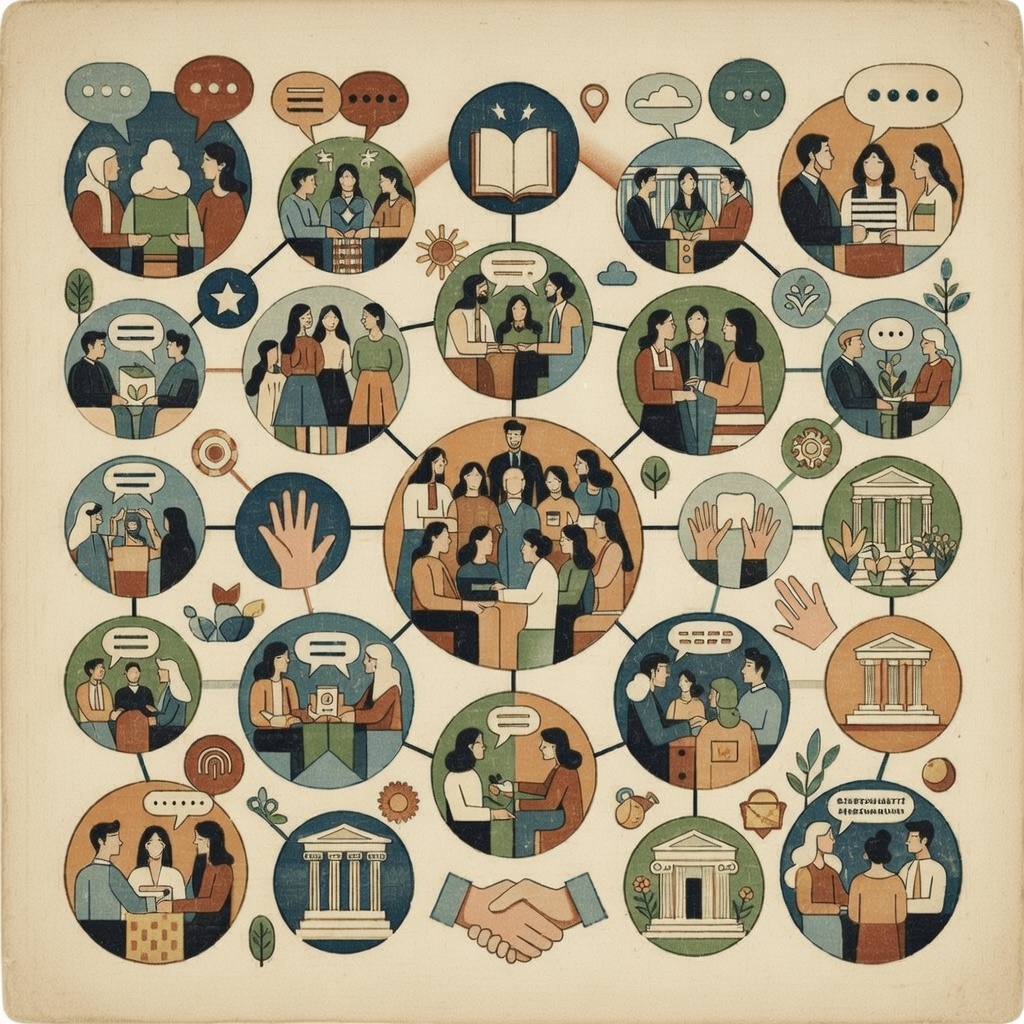Polycentric Governance: A Politics of Many Centers

In a world of sprawling complexity — of climate change, pandemics, digital economies, and displaced populations — the notion that any single institution, government, or leader could grasp the full picture seems increasingly implausible. The global problems we face are too entangled, too multidimensional, and too dynamic to be managed by a single center of authority.
Yet, this recognition need not lead us to despair. Instead, it invites us to consider an alternative vision of governance — one that relinquishes the illusion of control from the top, and embraces the possibility of coordinated plurality from the ground up. This is the promise of Polycentric Governance.
At first glance, the term sounds clinical, perhaps even bureaucratic. But look closer, and it reveals a deeper philosophical challenge to how we think about power, authority, and the very idea of political order. It compels us to ask: What if, rather than looking for a single solution, we designed systems that welcome many overlapping centers of decision-making — each responsive, each adaptive, each accountable in its own way?
Modern political thought has long been enchanted by the image of the singular sovereign. From Hobbes’s Leviathan to Weber’s bureaucratic state, legitimacy and order were to flow from one clear locus of authority. The idea was seductive: where one will rules, chaos recedes.
But reality is messier — and richer. Whether we examine environmental resource management, urban planning, or pandemic response, we find not centralized command, but a tapestry of actors: local communities, NGOs, courts, international agencies, indigenous councils, municipalities, scientific institutions, and citizen groups. These actors may operate with different norms and incentives, yet they often find ways to interact, overlap, and coordinate — sometimes in conflict, but often in productive tension.
The scholars Elinor and Vincent Ostrom brought this insight into focus. They observed that in many cases — particularly in managing common-pool resources like forests, fisheries, or irrigation systems — top-down state control failed, but so too did unchecked privatization. What succeeded, instead, were networks of governance that operated at multiple levels. The key was not uniformity, but diversity — not hierarchy, but polycentricity.
Polycentric governance asks us to take self-governance seriously. It proposes that people — when given the means, trust, and institutional support — can organize themselves to solve shared problems. It affirms the dignity of local knowledge and collective intelligence. But it also goes further: it suggests that the interplay of multiple centers can create systems more resilient than any singular authority could.
In doing so, it echoes an older, civic tradition. Just as Tocqueville marveled at the capacity of Americans to form associations to address public needs, polycentric governance relies on an ethos of participatory pluralism. It asks us to see governance not as a monologue issued from the state, but as a polyphony of voices, each with something to contribute.
This is not simply an administrative question. It is a moral one. What kind of society do we become when we distribute power widely, when we trust citizens to participate in shaping their own futures — not merely as voters in national elections, but as active agents in their neighborhoods, professions, and ecosystems?
Polycentric systems are not free of difficulty. They can create overlaps, contradictions, and tensions. Who decides when jurisdictions collide? How are the vulnerable protected if responsibilities are dispersed? How do we ensure that decentralization does not become fragmentation?
These are not trivial questions. But neither are they fatal. In fact, they invite us to a richer practice of politics — one that requires negotiation, transparency, and moral imagination. Polycentric governance demands that we abandon the search for a single answer, and instead develop the habits of coordination, reciprocity, and mutual recognition.
This is also where the moral dimension of polycentricity becomes clear. It is not enough to design institutional mechanisms; we must cultivate civic virtues — openness to other perspectives, patience with deliberation, commitment to dialogue across difference. In other words, the success of polycentric governance depends not just on the distribution of authority, but on the quality of the relationships between centers of decision-making.
What makes polycentric governance compelling is its balance of modesty and ambition. Modesty, because it refuses the hubris of total control. It recognizes that no one institution can foresee or manage every complexity. But ambition, too, because it affirms that through collaboration — horizontal, interlinked, and grounded in mutual respect — we can still govern wisely and justly.
In a time of climate breakdown, geopolitical flux, and democratic backsliding, we might be tempted to yearn for strong leaders and centralized action. But polycentric governance suggests a different path: that strength may lie in coordination, not command. That justice may emerge not from uniformity, but from negotiated diversity.
Polycentric governance does not ask us to dismantle the state, nor to celebrate unbounded localism. Instead, it offers a vision of democracy as a system of systems — where each level of governance reinforces and refines the others, where power is checked by proximity, and where solutions are shaped not only by experts, but by the lived wisdom of communities.
In this way, polycentric governance is not just a technical framework. It is a call to rethink how we live together. It invites us to trust not in distant abstractions, but in each other. And it reminds us — gently but firmly — that democracy is not about finding the center of power, but about multiplying the centers of responsibility.
It is, finally, a philosophy of hope. Not the naïve hope that all will go well, but the grounded hope that when people are given the chance to govern themselves — and to collaborate with others who do the same — something richer, fairer, and more enduring can emerge. A politics not of the few, but of the many.
